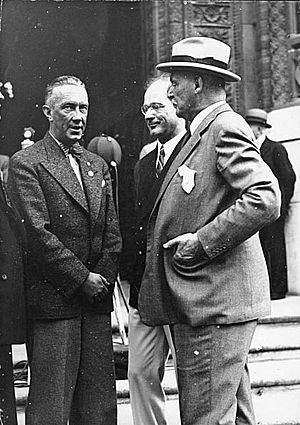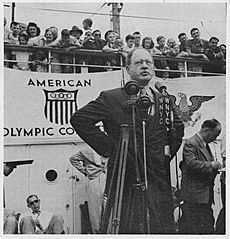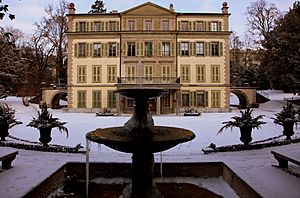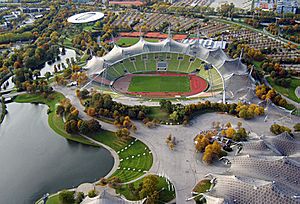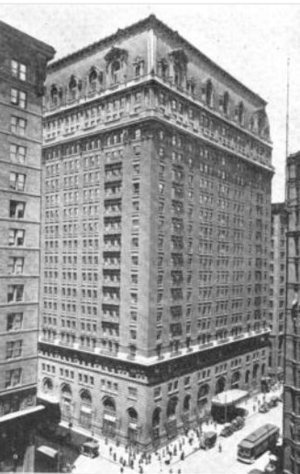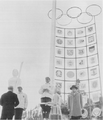Avery Brundage facts for kids
Quick facts for kids
Avery Brundage
|
|
|---|---|
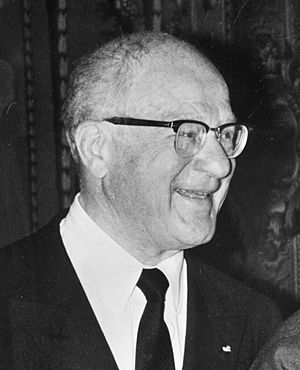
Brundage in 1964
|
|
| 5th President of the International Olympic Committee | |
| In office August 15, 1952 – September 11, 1972 |
|
| Preceded by | Sigfrid Edström |
| Succeeded by | Lord Killanin |
| Life Honorary President of the IOC | |
| In office September 11, 1972 – May 8, 1975 |
|
| Preceded by | Vacant, last held by Sigfrid Edström (1964) |
| Succeeded by | Vacant, next held by Lord Killanin (1980) |
| First Vice President of the IOC | |
| In office 1946–1952 |
|
| Preceded by | Sigfrid Edström (from 1942 to 1946 acted as IOC President) |
| Succeeded by | Armand Massard |
| Second Vice President of the IOC | |
| In office 1945–1946 |
|
| Preceded by | Office created |
| Succeeded by | Vacant, next held by Lord Burghley (1954) |
| Member of the International Olympic Committee | |
| In office July 30, 1936 – September 11, 1972 |
|
| Preceded by | Ernest Lee Jahncke |
| President of the United States Olympic Committee | |
| In office 1928 (as President of the American Olympic Committee) – 1953 |
|
| Preceded by | Douglas MacArthur |
| Succeeded by | Kenneth L. Wilson |
| Personal details | |
| Born | September 28, 1887 Detroit, Michigan, U.S. |
| Died | May 8, 1975 (aged 87) Garmisch-Partenkirchen, West Germany |
| Resting place | Rosehill Cemetery |
| Spouses |
Elizabeth Dunlap
(m. 1927; died 1971)Mariann Charlotte Katharina Stefanie, Princess Reuss
(m. 1973) |
| Children | 2 |
| Alma mater | University of Illinois |
| Profession |
|
| Signature |  |
Avery Brundage (September 28, 1887 – May 8, 1975) was an American sports leader. He was the fifth president of the International Olympic Committee (IOC) from 1952 to 1972. He was the only American and only non-European to hold this important position.
Brundage was a strong supporter of amateurism in sports. This meant athletes should compete for the love of the game, not for money. He was also involved in the 1936 Summer Olympics and the 1972 Summer Olympics, both held in Germany.
Born in Detroit, Brundage moved to Chicago as a child. His father left the family, and he was raised by relatives. He studied engineering at the University of Illinois and became a track star. He competed in the 1912 Summer Olympics but did not win medals. After his athletic career, he started a successful construction business. He earned his wealth from this company and never took payment for his sports work.
As a sports leader, Brundage quickly moved up in American sports groups. He became president of the American Olympic Committee in 1928. He fought against boycotting the 1936 Berlin Olympics. He was elected to the IOC that same year. He became IOC president in 1952. His time as president ended after the 1972 Munich Olympics. This event was sadly affected by a terrorist attack. Brundage decided the Games must continue.
Contents
Early Life and Sports Career
Growing Up in Chicago
Avery Brundage was born in Detroit, Michigan, on September 28, 1887. His father was a stonecutter. When Avery was five, his family moved to Chicago. Soon after, his father left his mother and two sons. Avery and his younger brother, Chester, were mostly raised by aunts and uncles.
At age 13, Avery won an essay contest. The prize was a trip to President William McKinley's second inauguration. He went to Sherwood Public School and then Crane Manual Training School in Chicago. He traveled seven miles by public transport to school after delivering newspapers. Even without sports facilities, he made his own equipment. By his last year, newspapers called him a schoolboy track star.
College and Early Work
After high school in 1905, Brundage went to the University of Illinois. He studied civil engineering and graduated with honors in 1909. He wrote for campus newspapers and continued playing sports. Brundage played basketball and ran track for Illinois. In his senior year, he helped his track team win a championship.
After college, Brundage worked as a construction supervisor. He oversaw the building of many large projects. He disliked the corruption in the Chicago building industry. In 1915, he started his own company, the Avery Brundage Company. His uncle, Edward J. Brundage, was a director.
Olympic Dream and Amateur Status
Brundage was a successful track and field athlete in college. In 1910, he finished third in the national all-around championships. He kept training for the 1912 Summer Olympics in Stockholm. At the Olympics, he finished sixth in the pentathlon and 16th in the decathlon. He did not win any medals.
Later, the winner of both events, Jim Thorpe, was disqualified. Thorpe had played semi-professional baseball, which meant he was not considered an amateur. Brundage moved up in the standings for both events. Brundage later refused to help restore Thorpe's medals. The IOC finally did so in 1982, after both men had passed away.
Brundage continued his athletic career. He was the US all-around champion in 1914, 1916, and 1918. After he stopped running track, he played American handball. He was ranked among the top ten players in the country.
Sports Leader and Olympic President
Rising Through the Ranks
As his track career ended, Brundage became involved in sports administration. He started with the Chicago Athletic Association. Then he joined the Amateur Athletic Union (AAU) in 1919. The AAU was in a power struggle with the National Collegiate Athletic Association (NCAA).
In 1928, Brundage was elected president of the American Olympic Association (AOA). This group later became the United States Olympic Committee. He also became president of the AAU in 1928. He held this post for many years. He helped bring peace between the NCAA and AAU.
Brundage was known for being very firm. In 1932, Olympic track star Babe Didrikson appeared in a car ad. The AAU, led by Brundage, quickly suspended her amateur status. Didrikson said she was not paid. Brundage replied that he had no problem with the rules when he was an athlete. He also said, "The ancient Greeks kept women out of their athletic games. They wouldn't even let them on the sidelines. I'm not so sure but they were right."
The 1936 Berlin Olympics
Should the US Boycott?
In 1931, the IOC chose Germany to host the 1936 Olympics. The Winter Games were in Bavaria, and the Summer Games in Berlin. After the Nazi Party came to power in 1933, there were calls to move or boycott the Games. The Nazis began persecuting Jews.
As head of the US Olympic movement, Brundage received many letters urging action. American Olympic champion Lillian Copeland accused Brundage of hiding the truth about Nazi Germany. She was one of 24 former US Olympic champions who asked the IOC to move the Games.
Brundage traveled to Germany in 1934 to see for himself. He met with government officials. When he returned, he reported that he had "positive assurance in writing" that there would be no discrimination against Jews. The American Olympic Committee voted to send the US team to Berlin.
Brundage believed that if the IOC accepted Germany's promise, the US should too. However, it became clear that no Jew would make the German team. Brundage said only 12 Jews had ever represented Germany in the Olympics. He felt it was not surprising if none did in 1936.
The AAU elected a new president, Jeremiah T. Mahoney, who supported a boycott. Brundage led the campaign against the boycott. At the AAU meeting in December 1935, Brundage's side won. The AAU approved sending a team to Berlin. Brundage believed the boycott debate could help raise money. He wrote that opposition from Jews would "arouse interest among thousands of people who have never subscribed before."
Events in Berlin
Brundage led the American team to Hamburg in July 1936. On July 30, the IOC met in Berlin. They expelled American IOC member Ernest Lee Jahncke, who supported the boycott. Brundage was elected to the IOC in his place.
One of the stars of the Games was Jesse Owens, a black American track athlete. He won four gold medals. Some stories said Hitler refused to shake his hand. This was not true. The IOC president had told Hitler not to shake hands with winners unless he shook hands with all of them.
Another controversy involved the US 4 × 100 meters relay team. Two Jewish sprinters, Sam Stoller and Marty Glickman, were removed from the team. Owens and another black athlete, Ralph Metcalfe, replaced them. The US team won the gold medal. Stoller and Glickman believed they were replaced to avoid embarrassing Hitler. Brundage denied any involvement in the decision.
Becoming IOC President
Brundage's first IOC meeting as a member was in Warsaw in 1937. He was selected for the executive board. He admired Germany after the Berlin Games. He spoke at a pro-Nazi meeting in New York in 1936. He said Germans were "united" and "believing in themselves."
The 1940 Olympic Games were canceled due to World War II. Brundage helped found the Pan-American Games. He saw them as a way to continue international sports. The first Pan-American Games were held in 1951.
The war divided the IOC. Brundage and IOC vice president Sigfrid Edström worked to keep the Olympic movement alive. Edström became acting president when the previous president died in 1942. Brundage became second vice-president in 1945. When Edström officially became president in 1946, Brundage was elected first vice-president.
Edström planned to retire after the 1952 Summer Olympics in Helsinki. Brundage ran for president against Lord Burghley of Great Britain. Brundage was elected IOC president on the final ballot.
Avery Brundage as IOC President (1952–1972)
The Fight for Amateurism
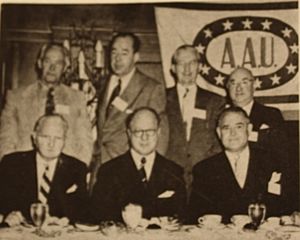
Brundage was an idealist. He strongly believed in amateur sports. He felt athletes should compete "for the love of the game itself." He saw professionals as part of the entertainment business. For Brundage, amateurism meant being good in many areas, not just one.
The rules for "amateur" status varied by sport. Brundage often fought over what money or gifts an athlete could accept. He found that national Olympic committees were not always strict with these rules. This was because the rules could hurt their athletes' chances for medals.
In 1932, Brundage helped disqualify Finnish runner Paavo Nurmi. Nurmi was accused of taking money. In 1972, Brundage banned Austrian skier Karl Schranz from the 1972 Winter Olympics for commercial activities. He called him "a walking billboard."
Countries in the Eastern Bloc had "full-time amateurs." Their athletes were given everything they needed to train. They were not technically paid, but the government supported them. This gave them an advantage over self-financed athletes from Western countries.
The Canadian Amateur Hockey Association wanted to use professional players. Brundage was against this. He said ice hockey's Olympic status would be at risk. Canada then withdrew from international hockey. After Brundage left office, "open competition" was allowed in the World Championships. However, professional NHL players were still not allowed in the Olympics.
Brundage's views on amateurism became outdated. Athletes felt others were making money from sports, but not them. In 1962, the IOC allowed payments for time missed from work, but only for athletes with dependents. In his final speech in 1972, Brundage stood firm. He said, "Olympic glory is for amateurs."
Leading the Olympic Movement
Brundage was not paid as IOC president. He sometimes spent $50,000 a year of his own money. In 1960, the IOC had almost no funds. They were slow to deal with television rights. The Rome organizing committee kept most of the money from the 1960 Games.
Later, selling television rights became a huge income source for the IOC. By 1968, it was $10 million. Brundage worried about this money. He warned, "The moment we handle money... there will be trouble."
Some national Olympic committees (NOCs) felt Brundage ignored their concerns. They formed a separate group, the Permanent General Assembly of National Olympic Committees (PGA-NOC). Brundage strongly opposed this group. The PGA-NOC wanted a share of TV money. They also wanted sports federations to set amateur rules, not the IOC.
Brundage was re-elected president in 1960 and 1964. In 1968, some IOC members wanted him out because he was 81. But he was easily re-elected. He promised to retire in 1972. Lord Killanin was elected first vice-president. Killanin was seen as Brundage's likely successor. He was more open to the NOCs' concerns.
Brundage lived in Chicago or California. Day-to-day IOC work was handled at their headquarters in Lausanne, Switzerland. In 1968, the IOC moved to a new building, the Château de Vidy.
Protests at the 1968 Mexico City Olympics
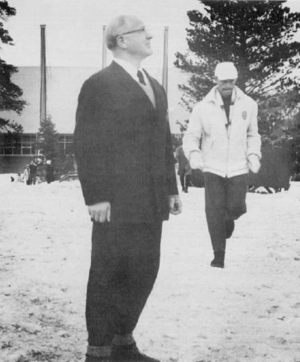
The year 1968 saw much unrest in the United States. Before the Olympics in Mexico City, some African Americans called for a boycott. But most athletes did not want to waste years of training. There were also protests in Mexico City itself before the Games.
During the Games, black US athletes had tensions with white athletes. After winning the 200 meters, Tommie Smith said he did not want Brundage to present him a medal. The next day, Smith and John Carlos won gold and bronze. As the US anthem played, they raised black-gloved fists. This was a symbol of black power.
Brundage saw this as a political statement. He felt it did not belong in the Olympics. He ordered Smith and Carlos suspended from the US team. He also banned them from the Olympic Village. When the US Olympic Committee refused, Brundage threatened to ban the entire US track team. This led to the two athletes being expelled.
Other African American athletes also protested. The three medalists in the 400 meters wore black berets. Boxer George Foreman waved a small American flag. Brundage called the Smith-Carlos incident "Warped mentalities and cracked personalities."
The 1972 Munich Olympics
In August 1972, the IOC elected Lord Killanin as Brundage's successor. Killanin would take office after the Games. Brundage did not vote for Killanin. He felt Killanin was not strong enough to lead the Olympic movement.
Brundage hoped the Munich Games would be cheerful. They started well, with athletes like Olga Korbut and Mark Spitz performing amazing feats. But on September 5, 1972, Palestinian terrorists entered the Olympic Village. They took 11 Israeli team members hostage.
Brundage rushed to the Village. He met with German officials. German police tried a rescue later that night. It failed, and the nine remaining hostages were killed.
IOC officials met. Brundage canceled the day's events. He announced a memorial service for the next morning. Many leaders felt Brundage should not have been involved in the government talks. But all supported the memorial service.
At the service, Brundage spoke. He said, "The Games must go on." The crowd applauded. He also mentioned the earlier decision to exclude Rhodesia. He said this was a matter of sports, not politics. Many criticized him for bringing up Rhodesia at such a sad time. Brundage later said he did it on purpose. He felt principles were as important as human lives.
Retirement and Later Life
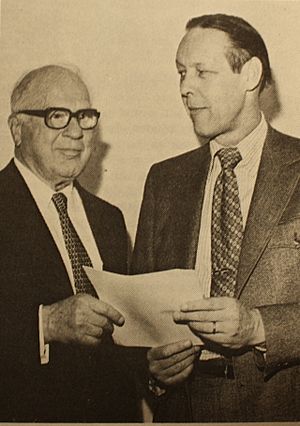
Brundage retired as IOC president after the 1972 Summer Games. His first wife, Elizabeth, died in 1971. In 1973, he married Princess Mariann Charlotte Katharina Stefanie von Reuss. She had worked as an interpreter at the Munich Games.
In January 1974, Brundage had surgery for his eyes. He was frail at 87. He went on a final trip to the Far East with his wife. He died on May 8, 1975, in Garmisch-Partenkirchen, Germany. He was buried in Rosehill Cemetery in Chicago.
In his will, Brundage left money to his wife and for charity. He gave his papers and Olympic items to the University of Illinois. He had already given the university $350,000 for scholarships. These scholarships were for students who played sports but did not get athletic scholarships.
Personal Life and Business
Family Life
In 1927, at age 40, Brundage married Elizabeth Dunlap. She was the daughter of a Chicago banker. Elizabeth was a trained singer and loved classical music. She died in 1971.
In 1973, Brundage married Princess Mariann Charlotte Katharina Stefanie von Reuss. He did not have children with either of his wives.
Construction Business
After starting his company in 1915, Avery Brundage Company got many government contracts during wartime. In the 1920s, Brundage built many high-rise apartment buildings in Chicago. He used fast construction methods. This allowed owners to earn money from their buildings quickly.
His company also built hotels. Sometimes, he was paid with stock in the new hotel. In 1923, Brundage built a huge assembly plant for the Ford Motor Company in Chicago. It cost $4 million and was the largest industrial plant he built.
The Great Depression in 1929 was a setback for Brundage. But he rebuilt his wealth by investing in real estate. He bought stocks and bonds in struggling companies for very little money. By 1960, his fortune was estimated at $25 million.
A major investment was Chicago's La Salle Hotel. Brundage first leased it in 1940, then bought it. When the hotel was damaged by fire in 1946, Brundage spent $2.5 million to fix it. He lived there during his time as IOC president. He sold the hotel in 1970.
Art Collector and Supporter
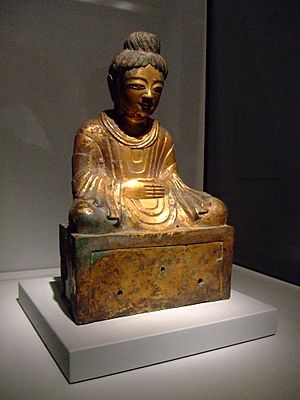
Brundage became interested in Asian art after visiting an exhibition in London in 1936. He said, "I came away so enamored with Chinese art that I've been broke ever since." He started collecting actively after visiting Japan in 1939. He also visited Shanghai and Hong Kong.
He became a major collector of Asian art. During World War II, he bought many items from Japanese dealers. Dealers found him willing to spend money, but also a tough negotiator. Brundage rarely bought fake pieces. His collection was considered one of the largest and most important in private hands.
Brundage hired French scholar René-Yvon Lefebvre d'Argencé as his art curator. They built a large collection of jade, bronzes, and Buddhas. Brundage admired the Chinese Emperor Huizong of the Song dynasty. He tried but never got any of his work.
By the late 1950s, Brundage's homes were full of art. In 1959, he agreed to give part of his collection to San Francisco. The city voted to raise money to house the art. This led to the Asian Art Museum of San Francisco, which opened in 1966. Brundage made another large donation in 1969. He left the rest of his collection to the museum in his will. Today, the museum has 7,700 pieces from Brundage.
Brundage saw a connection between art and amateur sports. In a speech in 1958, he talked about netsuke, small Japanese carvings. He said the best ones were made by amateurs. They put "something of himself into the design." He felt professional carvings were "cold, stiff, and without imagination." He said this showed the difference between amateurism and professionalism.
Legacy
Avery Brundage was the only American and only non-European to be IOC president. His legacy is mixed. Some remember him for his strong views on amateurism. Others remember his actions during the 1936 and 1972 Olympics.
In 2021, San Francisco's Asian Art Museum removed a statue of Brundage. The museum director said Brundage "espoused racist and anti-Semitic views."
Some critics say Brundage admired Hitler. They also point to the decision to remove two Jewish sprinters from the 1936 US relay team. However, others, like Dick Pound, believe Brundage was one of the IOC's great presidents. They say he held the Olympic movement together during difficult times.
Images for kids
-
Brundage (left) and other Olympic officials on board and with the captain of the SS Bremen, en route to the 1936 Winter Olympics in Garmisch-Partenkirchen, Nazi Germany
See also
 In Spanish: Avery Brundage para niños
In Spanish: Avery Brundage para niños
 | James Van Der Zee |
 | Alma Thomas |
 | Ellis Wilson |
 | Margaret Taylor-Burroughs |


